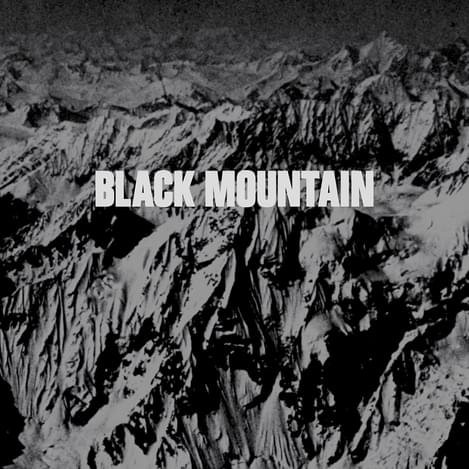Black Mountain's debut 10 years later: An ode to the '70s
"Black Mountain (10th Anniversary Deluxe Edition)"

The middle of the last decade saw (too many) bands aping riffs and ideas in pursuit of reliving the good times…or whatever. Some were great (The Sword, The Darkness), some were not (Wolfmother, Audioslave). Some bands even dabbled in the psychedelic aspects of the ‘70s (The Mars Volta, Coheed and Cambria) while rocking out.
Then there's Black Mountain. Begun by frontman Stephen McBean as a record for his previous band, Jerk with a Bomb, Black Mountain's self-titled debut grew and morphed into something else entirely alongside the band itself. The result was seen by its creators as something between Black Flag and Black Sabbath. While that description isn't entirely accurate given the final product, it is nonetheless an effective, if simplistic, touchstone for what Black Mountain is.
Which is to say, the album is McBean's attempt at a culmination of what made '70s rock so great in the first place: a spectrum of music that evokes memories while also rocking (the fuck) out. Black Mountain is less a collection of songs than a series of smart compositions constructed around important moments. The blast of power chords at the end of opener "Modern Music" or the disco-esque beat that begins "No Hits" or the danceable metal of "Druganaut" - whatever the case, these tracks are structured in such a way as to remind you of the first time you discovered some of the best music ever.
That first time you discovered your favorite anti-establishment screed? Thanks to the chanting of "'Cause nobody likes your fucked up plans" from "Faulty Times," you can reminisce about it. Or how about hearing the height of '70s prog rock pretension à la Genesis or Jethro Tull? Check out the space-y middle third of "Don't Run Our Hearts Around" for that acid flashback. It's not so much spot-the-influence as it is "remember the time." You could play this fun game all day spinning Black Mountain's debut.
Yet, the compositions themselves are the real stars here. From the Velvet Underground-inspired "No Satisfaction" to the grim, "Welcome to the Machine" vibe of "Heart of Sorrow", you effectively get an overview of the entire decade in eight tracks. It's what separates Black Mountain from every other revivalist: they use the '70s as a starting point and paint it over with their own broad, indie-rock strokes instead of simply taking an idea from a single band and running with it. "Don't Run" starts with an insistent, concrete-splitting riff, but its main attraction is the prog tendencies. The loud-quiet-loud dynamic, especially the last third build-up from plodding to freight train-speed, is almost Black Mountain saying to other revivalists, "See guys, this is how you do it."
As a whole, the record's first half is nearly perfect, largely because of how beautifully paced it is. Four tracks in under 17 minutes - done. The quick spaz sessions "Modern Music," "Druganaut," and "No Satisfaction" are paired with the proto-doom metal "Don't Run." It's a great sampler of funk, blues metal, strung out chords, and even some Pixies and Sonic Youth for good measure.
Side B, unfortunately, doesn't fare as well for the same reason Side A does: pacing. The bulk of the runtime comes in the second four-song set, and it's here where Black Mountain's self-indulgence catches up with them. The shortest song is over six and a half minutes and, with no way to break up the pacing, it's all compositional wankery. Granted, the second half is still immensely engaging - and at no point is the album unlistenable or uninteresting - but it would be better served by rearranging the track order. (The crushing irony, though, is that a reordering of the album risks ruining Side A.) At any rate, Black Mountain is great introduction to not only the band, but also the decade the band loves so much.
The reissue comes with a number of bonus tracks (including four unreleased), and there are some real gems to be found. "Bicycle Man" and "Behind the Fall" stomp around like Stooges outtakes, complete with a fire hydrant sax. There's also some fun in the acoustic-meets-squealing-electronics oddity that is "It wasn't Arson". The only real miss is "Buffalo Swan", a patience-testing, nine-minute, droning Neil Young impression.
There are some alternate versions of album cuts, as well. The demo version of "Set Us Free" throws out the itchy slink and guitar dueling of the album version and reduces the song to an acoustic-driven folk screed with McBean howling "Overthrow your war machine" like a banshee. Similarly, the UK Radio recording of "No Satisfaction" shaves off any bar band pop sensibilities and buries the entire performance in rough-edged swirling distortion. The extended mix of "Druganaut" is simply that - an extended take on the song with the most groove of any here.
And that's the main reason to listen to Black Mountain, anyway - their take on the '70s. Much like the memories they conjure, the band's interpretation of rock's greatest decade may not always be factually accurate but, dammit, does it feel right.
Get the Best Fit take on the week in music direct to your inbox every Friday

Tunde Adebimpe
Thee Black Boltz

Julien Baker & TORRES
Send A Prayer My Way

Bon Iver
SABLE, fABLE





